The FIFA Club World Cup 2025, in its 21st edition, is already delivering a series of compelling narratives as it progresses toward the Round of 16. This year's revamped format, featuring an expanded field of teams, a redesigned trophy, multiple host cities, and even the introduction of referee cam, brings the competition closer to the grandeur of its namesake, the quadrennial World Cup.
Organizers have hailed the tournament as "a celebration of hope, excellence, and pride, embodying the journey of every club, player, and fan united in their passion for the beautiful game." The increased duration and inclusion of several debutant teams have significantly elevated the tournament's status.
Teams representing all six confederations are participating: 12 from Europe, 6 from South America, 4 each from Africa, Asia, and North/Central America and the Caribbean, 1 from Oceania, and the host nation's representative, completing the 2025 lineup.
With the group stage now concluded and the final 16 teams determined, this edition of the Club World Cup has seen its share of surprising results, David vs. Goliath clashes, and intense moments, both on and off the field.

Image credit: FIFA.com
Auckland City, ranked a modest 4,971st in the Opta Power Rankings, entered the Club World Cup as the lowest-ranked team. They found themselves in a group with powerhouses like Bayern Munich, Benfica, and Boca Juniors. It's worth noting that Auckland City's squad is composed largely of amateur players competing in New Zealand's Northern League, a league comprising only 12 teams.
The team's campaign began with a harsh 0-10 defeat against Bayern Munich – the most lopsided result of the tournament thus far – followed by a 0-6 loss to Benfica.
Facing Argentinian giants Boca Juniors in their final match, Auckland City, already eliminated, had nothing to lose. In a classic underdog story, they defied expectations and denied Boca Juniors a place in the Round of 16. The 1-1 draw was particularly sweet, considering the 4,819-point difference in rankings and Boca's storied history.
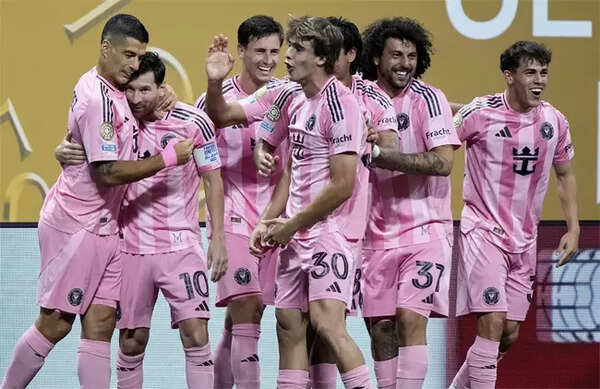
Inter Miami's Lionel Messi celebrates with Luis Suarez after scoring his side's second goal against FC Porto (AP Photo)
Inter Miami, led by Lionel Messi, entered the tournament grouped with formidable opponents like Porto, Al Ahly, and Palmeiras. Despite expectations of an early exit, the Argentine superstar, supported by Luis Suarez, Jordi Alba, and Sergio Busquets, propelled his team into the Round of 16, finishing second in Group A.
While Miami secured only one victory, it proved sufficient for qualification. Following a draw against Al Ahly in their opening match, Miami faced Portuguese giants Porto. Messi's brilliance, highlighted by a remarkable free kick, secured a 2-1 victory. A 2-2 draw against Brazil's Palmeiras in their final group game sealed Miami's spot in the knockout stage.
Tensions reached a boiling point on the final matchday in Group E, where River Plate needed a victory to advance. However, Inter Milan dashed their hopes. After the final whistle, River's Marcos Acuna and Inter's Denzel Dumfries nearly engaged in a physical altercation, requiring intervention from both teams and support staff. The rivalry, dating back three years, saw Acuna taunt Dumfries with a reference to Argentina's victory over the Netherlands in a heated quarter-final at the 2022 World Cup.
The heat extended beyond the field, as heatwaves and extreme temperatures forced teams to provide ice baths and cold towels for their players. Borussia Dortmund took the extra step of having their substitutes watch their match against Mamelodi Sundowns from the locker room to shield them from the scorching conditions. The coach described the playing conditions as akin to a "sauna." Thunderstorms and lightning caused delays in at least five matches.
Adding another layer of complexity, U.S. Immigration and Customs Enforcement (ICE) had a presence at the tournament, marking a first for the competition. Customs and Border Protection (CBP) were also involved, requiring non-citizens to provide proof of legal status to attend games.
With less than a year remaining until the 2026 FIFA World Cup, co-hosted by the United States, Mexico, and Canada, the Club World Cup has highlighted several potential challenges, ranging from pitch quality to extreme weather conditions.
Real Madrid's Jude Bellingham criticized the poor pitch conditions, stating, "The pitches aren’t great here. The pitches aren’t great at all," after his team's match against Pachuca in Charlotte.
Despite the emergence of underdog stories and a broader field of competitors, the tournament continues to be dominated by Europe's elite clubs. Powerhouses like Real Madrid and Manchester City remain strong contenders for the title. Notably, five teams – Seattle Sounders, Urawa Reds, Ulsan, Wydad AC, and Pachuca – were eliminated without earning a single point.
Here is the list of teams that have qualified for the Round of 16:
Newer articles
Older articles
 FIFA Club World Cup 2025: Group Stage Delivers Upsets, Messi Magic, and Heatwave Havoc
FIFA Club World Cup 2025: Group Stage Delivers Upsets, Messi Magic, and Heatwave Havoc
 Rishabh Pant's "Revolutionary" Batting Style Reshaping Cricket, Claims Greg Chappell
Rishabh Pant's "Revolutionary" Batting Style Reshaping Cricket, Claims Greg Chappell
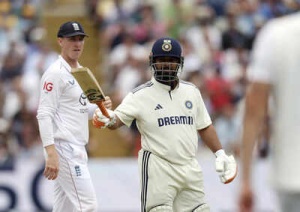 IND vs ENG, 2nd Test: Rishabh Pant's Witty Retort Silences Harry Brook's Sledging Attempt
Or
India vs England, 2nd Test: Rishabh Pant's Calm Reply Defuses Harry Brook's Sledging Tactics
IND vs ENG, 2nd Test: Rishabh Pant's Witty Retort Silences Harry Brook's Sledging Attempt
Or
India vs England, 2nd Test: Rishabh Pant's Calm Reply Defuses Harry Brook's Sledging Tactics
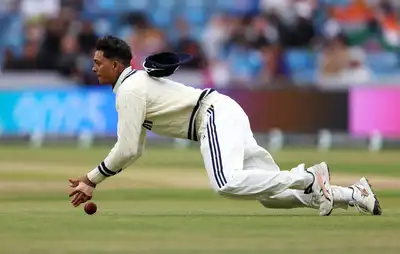 India's Fielding Woes Blasted by Ex-Selector After First Test Loss to England
India's Fielding Woes Blasted by Ex-Selector After First Test Loss to England
 Mirabai Chanu: Olympic Medalist Reveals Relentless Focus on Weightlifting, Even During Family Time
Mirabai Chanu: Olympic Medalist Reveals Relentless Focus on Weightlifting, Even During Family Time
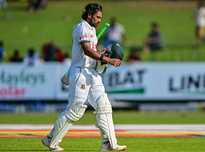 Najmul Hossain Resigns as Bangladesh Test Captain Following Sri Lanka Defeat
Najmul Hossain Resigns as Bangladesh Test Captain Following Sri Lanka Defeat
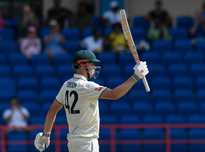 Green Aims for More Runs After Crucial Fifty at Number 3 Spot
Green Aims for More Runs After Crucial Fifty at Number 3 Spot
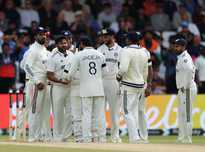 India's Collapse at Headingley: Gambhir Defends Lower Order Amidst Test Defeat
India's Collapse at Headingley: Gambhir Defends Lower Order Amidst Test Defeat
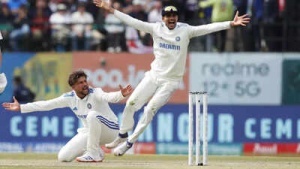 India vs England: Calls Mount for Kuldeep Yadav's Inclusion as Experts Highlight England's Spin Weakness
India vs England: Calls Mount for Kuldeep Yadav's Inclusion as Experts Highlight England's Spin Weakness
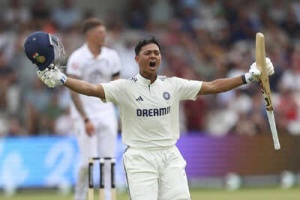 Jaiswal Nears Milestone: India Opener Eyes Gavaskar's 49-Year-Old Test Record at Edgbaston
Jaiswal Nears Milestone: India Opener Eyes Gavaskar's 49-Year-Old Test Record at Edgbaston